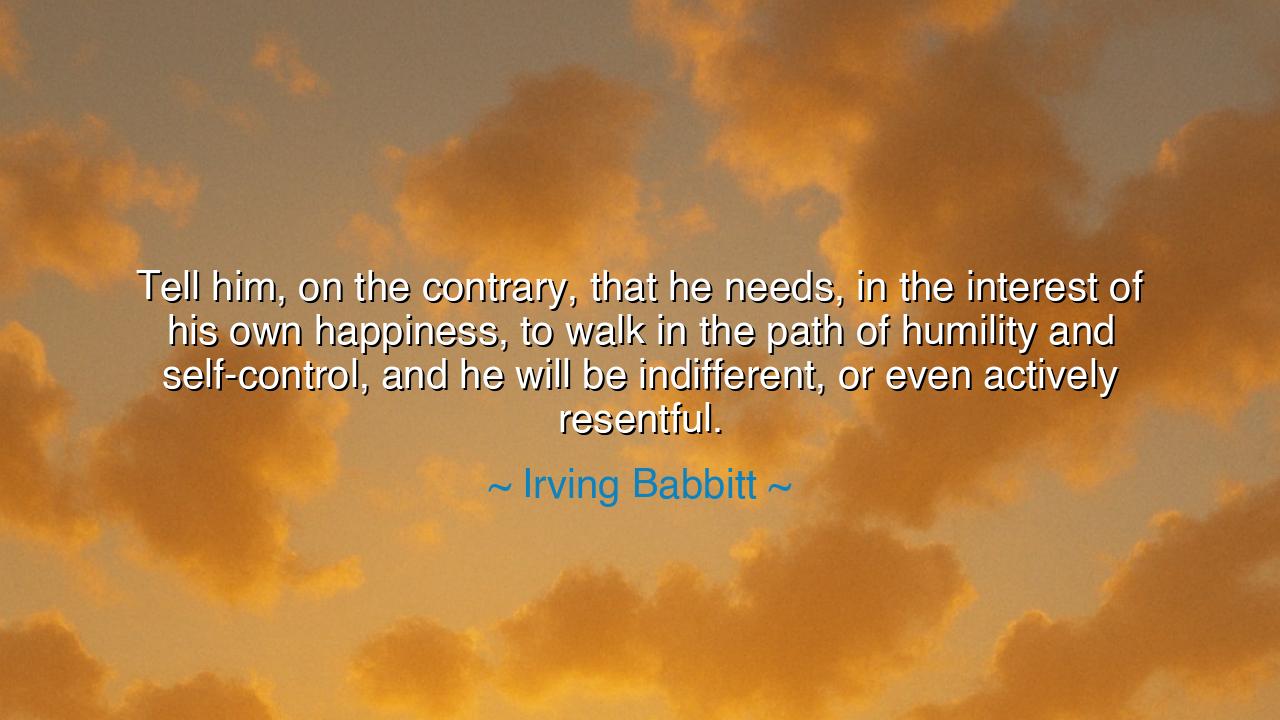
Tell him, on the contrary, that he needs, in the interest of his
Tell him, on the contrary, that he needs, in the interest of his own happiness, to walk in the path of humility and self-control, and he will be indifferent, or even actively resentful.






The words of Irving Babbitt—“Tell him, on the contrary, that he needs, in the interest of his own happiness, to walk in the path of humility and self-control, and he will be indifferent, or even actively resentful”—speak with the stern wisdom of the ancients, who knew that truth is rarely embraced by those unprepared to bear it. In this statement lies a timeless observation about the nature of man: that though he longs for happiness, he flees from the discipline that gives it shape. The path of humility and the practice of self-control are not easily loved, for they demand that we bow before reality, subdue our impulses, and master the storm within. And yet, as Babbitt teaches, it is precisely in this mastery that true happiness is found.
To understand these words, one must first know the man who spoke them. Irving Babbitt, a scholar of moral philosophy and literature in the early twentieth century, was a defender of what he called the “inner check”—the moral restraint that distinguishes civilization from chaos. He saw in modern life a growing rebellion against restraint, a hunger for freedom without responsibility. To such a generation, he warned, the call to humility would sound like weakness, and the call to self-control like tyranny. His insight was not new, but ancient: that man desires happiness without discipline, peace without effort, and meaning without sacrifice—and that this desire, unchecked, leads not to joy, but to ruin.
The ancients themselves taught this lesson in every age. Aristotle declared that virtue lies in the golden mean—between excess and deficiency—and that happiness, or eudaimonia, is not a gift of fortune but the fruit of self-mastery. The Stoics, too, from Epictetus to Marcus Aurelius, understood that freedom does not come from indulgence, but from the command of one’s desires. And yet, as Babbitt lamented, when one tells a man these truths—when one tells him that happiness demands discipline—he turns away in resentment. For pride whispers to him that to restrain himself is to be diminished, and ego persuades him that happiness should come easily, without effort.
There is a story told of King David, the warrior and poet of Israel. When the prophet Nathan rebuked him for his hidden sin, David could have silenced the prophet or denied his fault, as kings often did. Yet he bowed his head and said, “I have sinned.” In that moment, though he wore a crown, he became humble—and through humility, he found grace. This is the path of the wise: not the denial of fault, but the courage to confront it. Babbitt would have seen in David the example of the self-controlled man, one who rules not by power alone but by mastery of the heart.
Yet how rare is such humility! The world praises ambition, pleasure, and power, but it laughs at restraint. The one who seeks discipline is mocked as rigid; the one who practices moderation is called dull. But Babbitt reminds us that happiness without virtue is illusion. To be ruled by passion is to be enslaved by it. The man who follows every whim believes himself free, but he is driven like a leaf before the wind. Only the one who governs himself, who walks the narrow road of humility, can find peace that endures. For humility is not weakness—it is wisdom bowing before truth.
Babbitt’s warning carries the gravity of prophecy. When societies reject self-control, they lose not only their moral compass but their stability. The ancients saw this too: when Rome’s citizens ceased to govern their desires, their empire crumbled beneath the weight of its own indulgence. Luxury replaced virtue, arrogance replaced humility, and the republic fell to dust. In every age, the same law applies: where humility dies, pride rises; where discipline fades, chaos begins.
And so, dear listener, take this teaching to heart. The path of humility may seem narrow, but it leads to freedom. The practice of self-control may feel burdensome, but it grants strength. Do not resent those who tell you the hard truths, for they are your true friends. Seek not the fleeting comfort of indulgence, but the lasting joy of mastery. When anger burns, pause; when pride swells, remember your smallness; when temptation calls, think of what peace demands. For true happiness is not found in the pleasure that passes, but in the balance of the soul—that calm strength born of humility and self-command.
Thus, the wisdom of Irving Babbitt endures like an ancient flame: that man’s greatest freedom lies not in doing what he wishes, but in willing what is right. The one who walks in humility and rules himself by self-control walks the road of kings and sages, and though the world may mock him, his peace will outlast their laughter.






AAdministratorAdministrator
Welcome, honored guests. Please leave a comment, we will respond soon